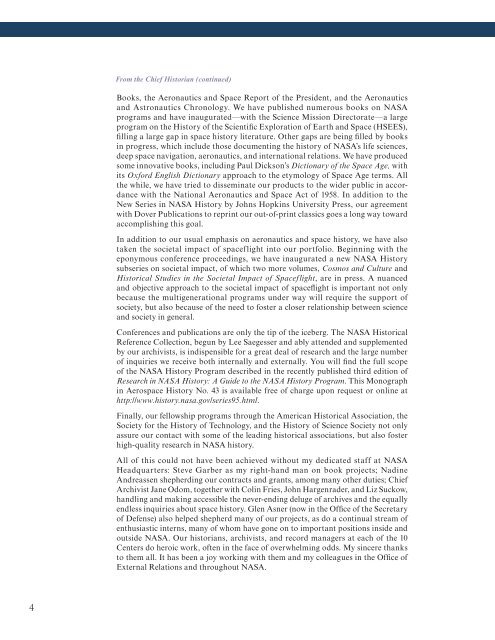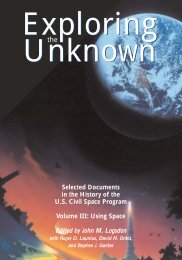FROM THE CHIEF HISTORIAN BORIS CHERTOK'S Rockets and ...
FROM THE CHIEF HISTORIAN BORIS CHERTOK'S Rockets and ...
FROM THE CHIEF HISTORIAN BORIS CHERTOK'S Rockets and ...
You also want an ePaper? Increase the reach of your titles
YUMPU automatically turns print PDFs into web optimized ePapers that Google loves.
nasa history division<br />
4<br />
From the Chief Historian (continued)<br />
Books, the Aeronautics <strong>and</strong> Space Report of the President, <strong>and</strong> the Aeronautics<br />
<strong>and</strong> Astronautics Chronology. We have published numerous books on NASA<br />
programs <strong>and</strong> have inaugurated—with the Science Mission Directorate—a large<br />
program on the History of the Scientifc Exploration of Earth <strong>and</strong> Space (HSEES),<br />
flling a large gap in space history literature. Other gaps are being flled by books<br />
in progress, which include those documenting the history of NASA’s life sciences,<br />
deep space navigation, aeronautics, <strong>and</strong> international relations. We have produced<br />
some innovative books, including Paul Dickson’s Dictionary of the Space Age, with<br />
its Oxford English Dictionary approach to the etymology of Space Age terms. All<br />
the while, we have tried to disseminate our products to the wider public in accordance<br />
with the National Aeronautics <strong>and</strong> Space Act of 1958. In addition to the<br />
New Series in NASA History by Johns Hopkins University Press, our agreement<br />
with Dover Publications to reprint our out-of-print classics goes a long way toward<br />
accomplishing this goal.<br />
In addition to our usual emphasis on aeronautics <strong>and</strong> space history, we have also<br />
taken the societal impact of spaceflight into our portfolio. Beginning with the<br />
eponymous conference proceedings, we have inaugurated a new NASA History<br />
subseries on societal impact, of which two more volumes, Cosmos <strong>and</strong> Culture <strong>and</strong><br />
Historical Studies in the Societal Impact of Spaceflight, are in press. A nuanced<br />
<strong>and</strong> objective approach to the societal impact of spacefight is important not only<br />
because the multigenerational programs under way will require the support of<br />
society, but also because of the need to foster a closer relationship between science<br />
<strong>and</strong> society in general.<br />
Conferences <strong>and</strong> publications are only the tip of the iceberg. The NASA Historical<br />
Reference Collection, begun by Lee Saegesser <strong>and</strong> ably attended <strong>and</strong> supplemented<br />
by our archivists, is indispensible for a great deal of research <strong>and</strong> the large number<br />
of inquiries we receive both internally <strong>and</strong> externally. You will fnd the full scope<br />
of the NASA History Program described in the recently published third edition of<br />
Research in NASA History: A Guide to the NASA History Program. This Monograph<br />
in Aerospace History No. 43 is available free of charge upon request or online at<br />
http://www.history.nasa.gov/series95.html.<br />
Finally, our fellowship programs through the American Historical Association, the<br />
Society for the History of Technology, <strong>and</strong> the History of Science Society not only<br />
assure our contact with some of the leading historical associations, but also foster<br />
high-quality research in NASA history.<br />
All of this could not have been achieved without my dedicated staff at NASA<br />
Headquarters: Steve Garber as my right-h<strong>and</strong> man on book projects; Nadine<br />
Andreassen shepherding our contracts <strong>and</strong> grants, among many other duties; Chief<br />
Archivist Jane Odom, together with Colin Fries, John Hargenrader, <strong>and</strong> Liz Suckow,<br />
h<strong>and</strong>ling <strong>and</strong> making accessible the never-ending deluge of archives <strong>and</strong> the equally<br />
endless inquiries about space history. Glen Asner (now in the Offce of the Secretary<br />
of Defense) also helped shepherd many of our projects, as do a continual stream of<br />
enthusiastic interns, many of whom have gone on to important positions inside <strong>and</strong><br />
outside NASA. Our historians, archivists, <strong>and</strong> record managers at each of the 10<br />
Centers do heroic work, often in the face of overwhelming odds. My sincere thanks<br />
to them all. It has been a joy working with them <strong>and</strong> my colleagues in the Offce of<br />
External Relations <strong>and</strong> throughout NASA.
















